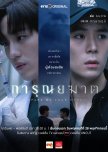
Cette critique peut contenir des spoilers
Falling in love gradually, and charming us all the way.
“Ingredients” is essentially a low budget two hander; but that description belies the seductive charm of its two leads and the captivating way it progresses from its initial concept to its final outcome.Initially conceived as a ten x 6 minute ep. romantic BL-themed foodie series on behalf of a Thai grocery chain to promote their products, the audience response apparently prompted a revised expanded show.
The key to its success is its casting of Jeff Satur and Gameplay Garnpaphon Laolerkiat, both experienced 26 year old actors, and both of whom were familiar with having played opposite each other previously, in the 2019 drama, “He She It”. Here, Satur plays Win, an aspiring songwriting musician, which he actually is, and Gameplay plays Tops, an aspiring chef, which he actually is also. This lends credibility to much of the action, of which, in a 6 minute episode, there’s not a lot. But, what is in abundance, is the almost accidental blossoming of a romance behind the most familiar of situations, house-mates sharing their days.
The story-line, such as it is, concerns Win preparing for his exams and Tops researching and trialling recipes for potential future use but which he uses in the present to aid or defuse a variety of problems that pop up in their lives. Tops is always there for Win during these moments and that reassuring presence creates a bond.
The show is not without its problems. There are the familiar defects in Thai productions of over-lit photography and unnatural set-ups; and the show is at its weakest when multiple other characters crowd into the modest location set used - at those times, the audio echoes and the camerawork loses focus. But these are compensated by the conversational almost improv style exchanges between the two leads in their solo scenes and the fluid camerawork responding to their dynamics. These scenes are the highlight of the show.
In between all of this, Satur entertains the audience with his casual but accomplished guitar work and songs that show off his warm and melodic voice, while Gameplay’s culinary dash in the kitchen scenes has professional flair.
Satur and Gameplay play and spark off each other with a disarming naturalness that made me feel like the proverbial “fly on the wall” observing private revelations. The progression to affection, and thence to confession, just in time for a forced parting, yields some of the most endearing and convincing of scenes between romantic leads in the BL genre. The long final meal scene in Ep. 21 looks like it was a multi-camera single take scene, but it also felt as if the two young men were genuinely sad their relationship in making this show was coming to an end. As did I.
Cet avis était-il utile?

Cette critique peut contenir des spoilers
An interesting premise but a disjointed plot.
“The Tuxedo” has an interesting premise, one of the best OST’s to come out of the Thai BL genre, and the appealing Green Phongsathorn Padungktiwong who plays the lead character. The director is Mike Phontharis Chotkijsadarsopon, whose previous stint at the helm of a BL was the mafia crim series “Golden Blood”. All up, “The Tuxedo” looks like a stylish movie but feels like a romantic soap.For all its good aspects, it has a long list of bad ones, most notable of which is its co-lead Chap Suppacheep Chanapai, who, despite his extensive list of acting credits, turns in quite a mediocre performance as the illegitimate scion of a wealthy industrialist and who suffers from a chronic syndrome stemming from childhood trauma (I”m guessing agoraphobia, although no doctor or therapist appears in the show to confirm this). Chap plays Nawee, an arrogant young man who somehow manages for three years to be the CEO of production in his father’s business while maintaining a reclusive existence in a sumptuous modern architect designed house & enclave in an obscure part of the country. Chap plays his scenes of panic attacks as if he were drugged; perhaps Director Mike & Chap preferred that Narwee appear to act more like he had a chemically-induced condition than a psychologically disturbed one. In any event, he is ultimately saved from his predicament by the love of Aioun, a fastidious high-end tailor, who runs an exclusive bespoke business from idiosyncratically designed premises in another obscure location.
The developing love story of these two men from different backgrounds who meet by strange circumstance is told with engaging sincerity; and the chemistry between the two leads is warm and convincing. The problem with the series is that instead of the plot concentrating on this, it meanders to include characters who are of little interest and omits other characters and situations that could have added to the drama. In this respect, unfortunately, the series shows the inexperience of newbie screenwriter Pacharawan Chaipuwarat.
Elsewhere, the writer has written of her script writing that she creates “the story based on public or client interests and conduct(s) research to obtain accurate factual background information authentic details.” This admirable work formula reveals itself in the detailed scenes of Aioun’s design work and pattern-cutting and suit-making (similar scenes to “Behind cut”). But attention to client (aka producer and/or director) interests can mean an inexperienced writer who is either not confident in how to put together a cohesive plot or who is reluctant to stand up for it in the often combative pre-production meetings. Whichever is the case, “The Tuxedo” includes Aioun’s two younger “brothers”, two elderly staff, Aioun’s fiancee, Narwee’s father & step-mother and step-brother, who all play minor roles in a very haphazard flow of sequences. The only additional character who is melded well into the story is Sichol, played by Tape Worrachai Sirikongsuwan. Tape has been acting for almost ten years and, though his character is largely comic in nature, he has enough scenes to show his capabilities and to draw Sichol as equally bumbling and caring.
Sichol is the character who connects the two leads together when he goes to the rescue of Aioun’s young brother, Oab, mugged at night by three ruffians. By way of thanks for helping Oab, Aioun offers Sichol a new suit to replace the one damaged in the brawl so that Sichol can still look presentable at his job interview the next day with Narwee. At that interview, the curt & dismissive Narwee likes nothing about Sichol but is attracted to the quality of the suit and offers Sichol the job if he can fulfil the task of getting the tailor who made that suit to make one for Narwee also.
Unbeknownst to both Sichol and Narwee, Aioun’s father had had his business ruined by the sharp business practices of Narwee’s father; not surprisingly therefore, Aioun turns down the suit request. We learn the reason Narwee is insistent on the best suit to be found hereabouts is because he is relying on it to impress his father at an upcoming birthday lunch Narwee is planning. We find out later that Narwee is his father’s bastard son who has been raised and elevated to a senior position in the father’s business but is now to be replaced by Narwee’s younger half-brother.
Given how important Dad is to both of the leads, it is a question worth asking why he appears in only episodes 5 & 6 (there are only 8 episodes). Unlike their Korean counterparts, a repeating habit of Thai BL creators is to put minor characters into set scenes in block fashion. I suspect this is for scheduling & budgeting reasons. What this means is that, unlike in real life where the people around us feature in many incidental ways, characters in Thai BL series appear to play a major scene and then disappear.
And this does not only apply to the Dad in “The Tuxedo”. (Aioun turns out to have a GF - we don’t learn of her existence till episode 6.) The show itself begins with neither Aioun or Narwee but with two minor characters, an elderly lady, one of Aioun’s employees, and Oab, Aioun’s young brother. Oab is an annoying fellow, whose main dramatic purpose is to so annoy his brother Art that Art revenges himself by concealing from Oab the client measurement book on which Aioun’s business depends. This irresponsible act is forgiven by Aioun (showing us his sympathetic considerate nature), even though it compels Aioun to make the trek to Narwee’s house to remeasure for the suit, hence another interaction in the developing love story.
The measurement book appears more often than some of the minor characters; it is a substantial soft leather cover journal; it is believable as a work item. But when Art conceals it in a pile of discarded fabric cut-offs, we are asked to believe that the elderly lady who cleans out the cut-offs, can’t feel the odd shape and weight of the journal concealed within the fabrics. Anyone who’s worked in the rag trade would know what a pile of fabric cut-offs weighs; cutting fabric is a skill - the less fabric cut from the roll, the lower the cost; and as another poster has pointed out, the wool fabrics suited to the Thai climate would be lightweight.
This “now you see them/now you don’t” approach to character appearances is at its worst in relation to Aioun’s GF, Chanjoa. She appears in only episodes 6, 7 & 8. She turns up at Aioun’s Birthday dinner celebration where she is aggressively spoken to by Narwee, angry at the discovery his love interest has a woman in his life. Aioun pacifies Narwee later by declaring his love, although Narwee will - after several more panic attacks - break off the relationship in childish jilted-lover fashion. Before this, however, Chanjoa is dispensed as a character in a remarkable scene where Aioun, tongue-tied, can’t find the words to explain why he is breaking off their relationship. Chanjoa departs the series (just in time for the final reconciliation of our lovers), walking out the door more of an adult than either of the two male leads.
As if Director Mike realises this disjointed story line has not created sufficient romantic atmosphere & tension, the scene at the end of the two lovers firmly committed into each others’ arms is played out against a five minute recap of their main scenes together from earlier in the series. Most avid BL fans know by now from the increasing flow of quality BL series out of Korea that the final scene is critical to the credibility of the love story and how well, for the most part, Korean creatives handle this aspect. “The Tuxedo” scores low in this regard.
Rewatch value is low. But on the plus side, Jeff Satur’s compositions on the music track are very good; the theme from his song “Because of you” is of sufficient quality that it works as a stand-alone orchestral piece.
A final word about Green’s performance. He succeeded in making Aioun the emotional centre of this show with his sympathetic performance. Aioun is both a creative artisan and a firm and successful businessman, but he is also the central axis of love and leadership around which his brothers and employees revolve and to whom Narwee gravitates. Green achieves this combination balancing act in a nicely sustained performance; hopefully we will see more of his talents in future series.
Cet avis était-il utile?

A slow drive about town.
This film is supposed to be a slow burn; it isn't. It's supposed to have hot sex scenes in it; it doesn't. It's supposed to have a storyline with a twist: It never happened. Instead we are served a chauffeur in a badly tailored jacket, and a supposedly wealthy wife who lacks any poise or class. That such a thin idea should have been funded into a motion picture is depressing because it makes me wonder what even worse script ideas are there out there that are being knocked back to make way for this one. What this film does have is a lot of is some terrific looking expensive and stylish locations. I guess you call call this film "real estate porn"; watch it to see what most of us are missing out on.Cet avis était-il utile?

A light romantic comedy
Watching this was a bit like eating fairy floss - similar to what you've eaten as a kid a long time ago and tempting to try again but only in a small amount (only 10 episodes - good choice, guys) because after being reminded of the familiar flavour, it's time to smile, give thanks, and move on to something more substantial.The music is nice, the photography good, and the sound goes a little awry at the end but otherwise, it's a technically good production.
Hong Wei Che plays goofy well and Yang I Hsuan plays a straight serious face like an Okame mask. The two actors look to have fun with each other although neither appears to be experienced in the kissing department, which in any event, suits their characters.
Cet avis était-il utile?

Cette critique peut contenir des spoilers
A psychological love mystery tale
“The Yearbook” is more of a psychological love mystery tale; it lives in the minds of its protagonists and their actions only obliquely reflect their thoughts and feelings. It’s neither a great success nor a great failure but it is different in ways which might challenge some viewers. It deserves a look and especially for the discovery of Title Teshin Anusananan in the lead role. (He looks even more handsome with his own hair style, btw; his hair was cut short for the role.)It’s almost impossible to know if this series was a great idea poorly executed or an amateur effort from the beginning. So many people associated with this series (director, writers, lead actors) were newbies (Man admitted that on his first day on set he didn’t even know the different instructions for slate/action/cut) that the story feels like it went into production half-baked and with seemingly no-one in control with the experience to know how to fix it.
So what is the problem with this series? It aspires to be a tear-jerker and creates a foundation story in the early episodes similar to other BL’s where the two male lead characters have known each other since childhood and who realise as they approach young adulthood that their closeness is more than friendship. The story uses flashbacks to regularly reference events in their recent and more distant past; some viewers have found this device to be repetitive and obstructive to the story’s trajectory. But I think the flashbacks suit “The Yearbook” as a mood piece; I didn’t feel to me like the usual BL situational drama.
The title “The Yearbook” is the key to what I believe the writers might have had in mind in creating this show. References to time are the clue; ostensibly, the time frame spans the lives of Nut and Phob from childhood to their early 20’s, but this is not the primary concern. “The Yearbook” is more concerned with time as it manifests itself in their minds, and in our minds we continually think over the events of yesterday as much as we do the events of last year or earlier. The young men are constantly referring back to the small moments as well as the big incidents between them, and we, the viewers, see this in the flashbacks. And the revelations via flashback are not chronological as to what each character is thinking or feeling.
Just as in real life, the boys in their minds relive the same moments again and again; this appears to have confused some viewers who can’t grasp why the same scene is being shown more than once.
(Spoiler ahead) If I’m right interpreting “The Yearbook” in this way, then the uncertain ending is also part of this approach; the future facing the young men is far from rosy or clear. Neither Nut nor Phob are secure in their futures to be pledging themselves to each other and the expectation that Nut, still a medical undergraduate, could take on by himself the medical, emotional and financial burden of Phob’s care & rehabilitation is taking Thai BL fantasies into new stratospheres of separation from reality.
Some have commented that almost nothing happens in the last episodes; this misunderstands the story. The entire series depicts the gradual realisation of love and then from that realisation, on to their commitments to each other, forged out of a crisis neither was prepared to face at first. Emotional journeys in my view are not the same as plots which are based on action and “The Yearbook” is thin on plot, thick on emotion.
The upshot of this is that big demands are made of the young actors for performances to reflect what is happening internally to their characters. Title is amazingly good but Man struggles in places. (Personally, I can’t get past the amateur if not outright cruel scheduling of putting Man’s most emotionally difficult & demanding scene on Day 1 of the shooting schedule. A newbie especially would benefit from the chance of growing into the demands of the role for a week or two before the heavy stuff is shot.)
Mean’s freshman directing effort is adequate but someone surely has to take the blame for the incessant music which is relied upon to excess IMO for emotional impact to bolster the drama.
Finally, ignore the MDL description of 8 x 50minute episodes. I suspect the show was created to achieve a friendly rating and to fit a one hour time-slot on afternoon tv. But not a single episode manages the 50 minutes minus the credits. The script is underdeveloped and has been stretched; this is clear from the fact that every episode has “fill” of interviews and similar that follow afterwards, culminating in the final episode, No. 8, being only 28 minutes in length, following which there is a further 25 minutes of interviews and behind the scenes. (Viewed on Riki Vakuten.)
Cet avis était-il utile?

Yes, gay parents can raise a happy gay child
Occasionally charming, frequently irritating, almost always excruciating in its inept performances and writing, “AiLongNhai” is a potentially good idea that needed more care and thought to pull off.Can a pair of gay parents successfully raise a child, and can they model a happy relationship to that child, and especially if the child is gay? The point of “AiLongNhai” is to answer ‘yes’ to both questions. It also introduces us to two very different characters, one raised in comparative wealth and who has an assured manner about him in the world, and the other, a young man reluctant to grow up to adulthood (nicely metaphored as the yellow plastic duck found in bathtubs). There is potential here for something interesting, but it fails to do so and became for me one of the hardest series to finish watching.
Ai, played by Meen Nichakoon Khajornborirak as if trying his hardest to remember his lines, has been raised by his gay father and his partner; he falls for the perpetually childish Nhai, played with appropriate surface shallowness by Ping Krittanum Anunchananum. Run Kantheephop Sirorattanaphanit’s debut outing as a screenwriter shows a newbie’s poor scene structure and preference for episodic incident over character development. Even the more experienced Director, Nob Sathanapong Kim Wongthong, can’t save this series from being a continuing experience of under-delivery.
Cet avis était-il utile?

A Shoulder to Cry On
0 personnes ont trouvé cette critique utile
Cette critique peut contenir des spoilers
Another quality Korean BL
It is the practice of some BL watchers, primarily I suspect from English speaking western countries, to criticise BLs for what they’re not, rather than watch them for what they are, preferring BLs to be “made to order”; the reaction to “A Shoulder To Cry On” has a lot of this, in my opinion.The clue is in the title (in Korean, literally “Comfort the Boy”). “A Shoulder To Cry On” is a part-BL because it tells part of the story of Da Yeol (played by Kim Jae Hwan) and Tae Hyun’s (played by Shin Ye Chan) relationship; the ending leads us to feel there is more to come as they develop as a couple. But for now, the story in front of us, is a gradual coming together of two high schoolers who have never been in love, have never had sex, and who are not sure of their future paths. The upside is that by becoming each other’s companion, they gradually work out what’s important for them on their path to adulthood. They end up being each other’s “shoulder to cry on”, a major stepping stone between friendship and lover.
Da Yeol’s world is centred on his sport of archery; success for him is the touchstone of his daily life. Tae Hyun, on the other hand, specialises in bad boy behaviour to give expression to his sense of low self-worth. In a key scene early in Ep. 1, Tae Hyun sneaks into the school infirmary with Won Kyung (mischievously played by Oh Joo Seok) who offers to demonstrate gay flirting or foreplay; but while there, in a scene notable for its delicate romanticism of soft music and slow-mo billowing curtain screen, he glimpses Da Yeol for the first time. The spark between the boys is immediate if uncertain.
In a recurrent theme that plays out in various ways in BLs, both boys come from single parent homes, raising questions of how children are affected by not growing up in a two parent home. Da Yeol treats his widower father with a kindly affection for his enthusiastic if simple prescriptions for happiness, while Tae Hyun, keenly aware of his adoption status, roils internally at his alienation from parent and place. What each boy lacks in their makeup, they find inadvertently along the bumpy road of their interactions, at first bristling with conflict & misunderstanding, but then followed by a curiosity in each other and a growing familiarity to an eventual fondness for the bond of friendship even though these may not yet be ties that will be life long.
Production values are of the usual high standard from Korean series; the leads, in their acting debuts here, give good performances over the arc of their emotional journeys - another tribute if one were needed (it’s not) to the quality of the Kpop training system which teaches aspirant teenage idols skills in modelling, dancing, speaking, public appearances, personal health and attire, as well as acting and singing.
The supporting players are uniformly good, but mention should be made of the actor playing Da Yeol’s father (uncredited in English on Viki, MyDramalist, IMDB, Wikipedia) whose unflinching affection for his son reminds of those parents whose love for their children is unending and overflowing: and Jo Ooh Seok, as the jealous Won Kyung (a rarity in BLs of a villainous gay character), who follows Tae Hyun around like a predator savouring its prey.
The music is good although the OST on Spotify includes only OMEGA X’s tracks.
Cet avis était-il utile?

My Personal Weatherman
2 personnes ont trouvé cette critique utile
Worth every minute of watching
The achievement of "My Personal Weatherman" is to take two characters, unlike each other in so many ways and seemingly so incompatible with each other, and by sleight of hand almost, show them understanding themselves and each other more, so that, by the end of this modest 8 episode series, their relationship evolves beyond the initial physical connection to more solid love and respect. Worth every minute of watching.MDL requires minimum 500 word reviews, so it's worth repeating:
The achievement of "My Personal Weatherman" is to take two characters, unlike each other in so many ways and seemingly so incompatible with each other, and by sleight of hand almost, show them understanding themselves and each other more, so that, by the end of this modest 8 episode series, their relationship evolves beyond the initial physical connection to more solid love and respect. Worth every minute of watching.
Cet avis était-il utile?

Cette critique peut contenir des spoilers
The show is a vehicle for Earth & Mix - nothing more.
I’ve never written a review before seeing all the episodes but with this one I can’t predict how long I’ll hold out so here’s a brief review so far.After the dramatic realism of “A Tale of Thousand Stars”, “Cupid’s Last Wish” is the polar opposite: a fantasy-comedy that is a vehicle for the popular coupling of Earth & Mix. Production values are good and the two stars are enthusiastic but the story is a dud and the first episode is a shocker. Mix’s character’s behaviour is so repellent only fans will want to keep watching. The plot jumps erratically from one extreme event to another and descends into farce. A car accident produces a head injury which the hospital resident ignores to allow the patient to leave within 24hours. A shaman appears and issues instructions which obliges the two leads to commence a road trip. So far, the show feels like it was put together by a committee working off the “Best of BL plots” list.
Cet avis était-il utile?

Lovers of drama will love this
A stand out drama from beginning to end. Not one scene is wasted or out of place; the end credit scenes alone are worth watching for the innovative treatment. Hard to believe this is Hashizume Shunki’s first drama; his direction is sure throughout, even allowing for his lead cast being highly experienced actors and a screen-adaption from the mangas by Asano Taeke who has 60 scriptwriting credits to her name.Heart-breaking and gut-wrenching in slow motion as this story of friends and lovers plays out over 8 years of their lives together, and apart. A piece of LGBTQ+ storytelling so good it merits an exceptional quality award.
But a word of warning: those who wish for clean tidy resolutions should know that “More Than Words” is true to life, and aspects of the story could easily yield a follow-up. Instead it ends with the certainty that while we live there is no end point to the emotional knots these characters have consented to being in. And yet, over 340 minutes, their story held me captive with their love and care and desire to not let go of each other.
Cet avis était-il utile?

A peculiar love affair
Doubtless, many theses could be written about the Japanese psycho-sexual cultural impulse. In this series, the character Hira’s low self-esteem manifests itself in a fantasy obsession with the aloof, vain and arrogant Kiyoi. The peculiar Japanese take on this relationship imbalance is that Hira welcomes and Kiyoi obliges with masochistic behaviours. The two lead actors do outstanding work portraying these flawed characters. Kioyi evolves through his trail of humiliating failures to achieve some humility and regard for Hira. Hira’s character, on the other hand, barely leaves his comfort zone of demeanment and in the end, the writers ask us to accept that Kioyi’s continual slurs are meant as tokens of affection instead of the corrosive verbal instruments of degradation that they actually are. In my opinion, this relationship does not have the happy future the show’s creators would like us to believe. Production values are good and the earnestness of everyone involved is without question.Cet avis était-il utile?

Cette critique peut contenir des spoilers
BL baiting at its worst
BL baiting at its worst. It's hard for me to be kind towards this series which took a serious subject and minimalised it. The avoidance of the romance made the final concoction even worse, because the inherent conflict of love and death is the stuff of the real world. In the end, the creatives wimped the story into a simplistic crime story. Saving the characters' struggle with the ethics of euthanasia to one scene at the end only made the whole thing worse. The actors were good and deserve a better vehicle for their smouldering good looks and physical attraction.Cet avis était-il utile?



